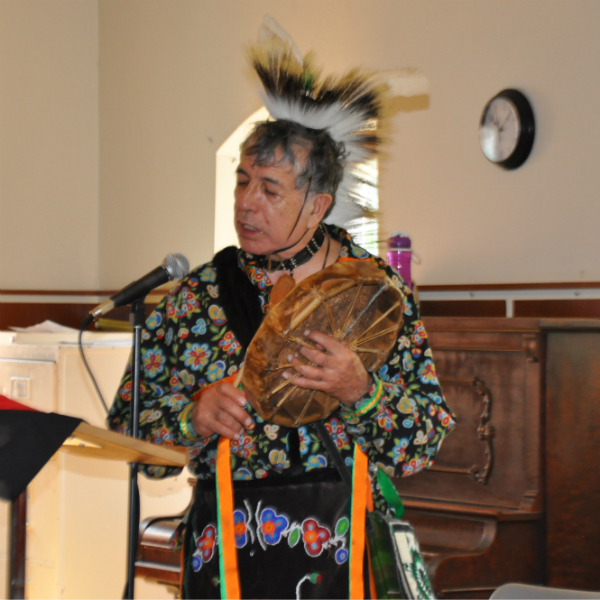Truth and Reconciliation: A movement of the Holy Spiritâ€
Diocesan event fosters learning about Canada's history and invites steps toward reconciliation
Posted June 13, 2016
Nearly 100 people from across the diocese gathered at St. Andrew's, Grimsby on the traditional territory of several indigenous peoples, including the Neutrals, the Mississaugas, and the Haudenosaunee, for a day of learning, sharing and reflection.
 Elder Garry Sault (pictured right) from the Mississaugas of the New Credit First Nation offered a warm welcome to the territory and captivated those in attendance with his stories and wampum teaching.
Elder Garry Sault (pictured right) from the Mississaugas of the New Credit First Nation offered a warm welcome to the territory and captivated those in attendance with his stories and wampum teaching.
Calling the work of truth and reconciliation “a movement of the Holy Spirit,” Bishop Michael Bird reiterated the commitment he made at last year’s synod to be active and faithful in response to the work of the Truth and Reconciliation Commission. He added that our journey towards reconciliation will be guided by indigenous leaders, noting how pleased he was that Archdeacon Val Kerr had accepted his appointment as the diocese’s first ever archdeacon for truth, reconciliation and indigenous ministry.
Through the Blanket Exercise, participants made profound, disturbing and surprising connections regarding the impact of Canada’s colonial past and current realities. In a sharing circle afterwards, those present were reminded that it is not possible to “unlearn something” and encouraged to share their new awareness with friends, family and neighbours. Now in its fourth edition, this experiential learning activity was developed by KAIROS to give Canadians insight into historic and contemporary relationships between indigenous and non-indigenous peoples throughout Canada’s history.
During an afternoon panel session, Jennifer Henry, executive director of KAIROS, reflected that it is the courage of survivors that brought forward the truth and that “we need to reconcile ourselves to this truth.”
Bishop Mark MacDonald, national indigenous bishop, suggested Canada’s troubled history of relations between indigenous and settler communities means that all Canadians have a role in creating a better future for indigenous people. “Every single Canadian needs healing from this past, but every single Canadian has a promise in this future which is coming upon us,” he observed.
Ms. Henry and Bishop MacDonald and were joined on the panel by Archdeacon Val Kerr, rector of St. John’s, Niagara Falls, and Donna Bomberry, retired indigenous ministry coordinator for the Anglican Church of Canada. Together they offered insights about the Anglican Church of Canada’s response to the 94 Calls to Action made by the Truth and Reconciliation Commission.
Archbishop Fred Hiltz’s reference to a verse of encouragement in the Letter of James, “Let our yes be yes!” not only provided a theme for the event but also a call to faithful action that resonated with many in attendance. Michael Wilson from All Saints, Erin, noted that his parish was working through the public reading of all 94 Calls to Action as part of their commitment to this work.
Participants also had a chance to indicate their interest in coming alongside the work of the Spirit by volunteering for the following teams: anti-racism training, liturgical resources, Blanket Exercise facilitation, educational resources team, community partnerships team, and Indigenous ministry development. If you are interested in working in any of these areas, please email the Reverend Bill Mous.
The event comes just over a week away from the observance of National Aboriginal Day. This year the Primate, Archbishop Fred Hiltz, has requested "that on National Aboriginal Day, June 21 or the Sunday closest there be a public reading of the UN Declaration on the Rights of Indigenous Peoples in every parish across Canada." Copies of the UN Declaration are available here, or in this creative video, and liturgical resources can be found here.